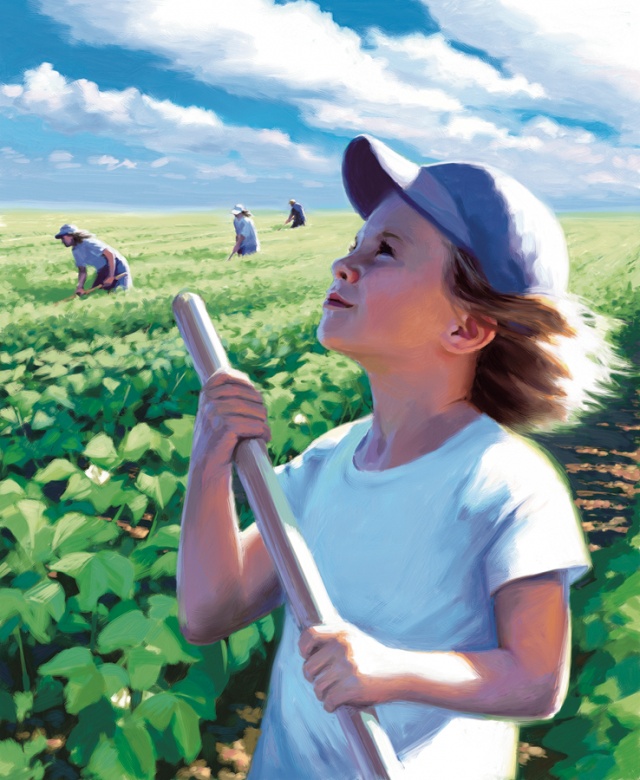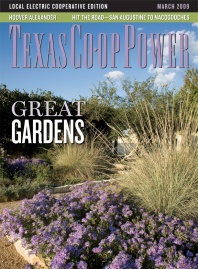Tears streamed down my reddened face. As a scorching July sun beat down on the cotton field, I dug my boot heels into the dirt, clenched the wooden handle of my hoe and screamed at my sister Jenny, “Don’t hoe my weeds!”
Jenny just ignored me, hotheaded little 6-year-old that I was. She had, after all, a job to do. And at the moment, that job included hoeing the weeds that I had missed. She marched into my row, raised her sharpened hoe, and carefully attacked the milkweeds interwoven with the cotton stalks.
Nobody—NOBODY—was going to hoe my weeds for me, I fumed. Yes, I was young. I was slow. I daydreamed and talked to myself and walked past big, obvious weeds. I sometimes mistook tall weeds for cotton and hoed up the wrong plant (to the untrained eye, cockleburs and cotton stalks could be twins). My brow furrowed under the brim of my cap, I cried and stamped my feet, and at 9 o’clock on a sizzling summer morning, I would ask if we EVER were going home for lunch. While my older siblings—Amanda, Jenny and Nathan—toiled up and down half-mile-long rows, making round after round, I was allowed to sit in the pickup on the caliche turn row (called a turn row because that’s where tractors turn around to start another round in the field) and drink red Kool-Aid from a big green jug.
I hated hoeing. I hated weeds. White weeds. Ironweeds. Blue weeds. Lake weeds. Careless weeds. And I hated that helpless feeling when my siblings, much faster than I, were already starting another round while I was still 200 yards from the end of the field.
But I loved growing up on a farm southeast of Lubbock on the South Plains. I loved driving the little Ford tractor—it went real fast in fourth gear and bounced over turn-row mud holes amazingly well—and plowing weeds in the blank rows (a safe area of the field where an inexperienced farmhand can’t possibly plow up precious cotton). I loved driving the old green Chevrolet pickup while Daddy loaded irrigation pipe onto its pipe racks and, ducking his head to avoid the swaying racks, yelled at me to stop popping the slippery clutch. I loved hauling aluminum pipe by hand across muddy fields because I could hold my own with my siblings.
On especially hot days in the field, I loved chasing the languidly moving patch of shade cast by a solitary cloud. And when the cloud had moved on, we’d sit on irrigation pipe carrying cold well water and cool our bottoms for a while.
I loved driving the pickup behind my dad’s tractor while he moved to another field. I loved listening to the radio in the pickup and singing along with Otis Redding (“I’m sittin’ on the dock of the bay, watching the tide roll away …”) at the top of my lungs.
As much as I detested hoeing, I loved its rituals: In the morning, en route to the field, we’d pile into the back of the pickup, lining up our hoes in the bed. In the late afternoon, when the last round had been hoed for the day, we’d mark our place in the rows with a mound of dirt.
Daddy even had a ritual: After lunch, he’d open the curtains and lie down on the sun-splashed family-room floor, pull the newspaper over his face and listen to comedian Jerry Clower records until he fell asleep. The longer he napped, the less time we had to spend in the field in the afternoon. I stayed real quiet during those naps.
I loved anything that got us out of hoeing. Vacation Bible School. Swimming lessons. Thunderstorms. But rain didn’t always guarantee freedom—just when I thought the fields were too soggy to enter, my dad would announce that it was a perfect time to buckle up our mud boots and pull cockleburs out of the softened ground.
Sometimes, sinking up to my shins in the mud, I’d wonder how my young life had come to this.
But truthfully, I was proud of getting dirty. I knew I had arrived when I, too, was rolling around in the field, kicking, wrestling and yelping in a melee started by one of my siblings during a long, hot round of temper-producing hoeing. (I, of course, was young and innocent and would never start a fight. I just liked to pile on.) I learned two lessons from our fights: 1) Run like heck when someone’s swinging a hoe at your head; and 2) the greener the cotton boll, the harder it hits upon impact.
Those were the good old days. Sometimes, though, my parents hoed with us, and we had to behave.
Little philosopher that I was, I often wondered aloud, “Why do we have to hoe?” It seemed to me that the cotton could fend for itself. Instead of swinging a hoe, I wanted to be riding horses, tearing through the mesquite under the Caprock on my granddaddy’s ranch where my dad and his siblings also ran cattle.
I always fancied myself more rancher than farmer.
But something happened through the years. The more I hoed, the more I grew to love it. I imagined that wind-blown cotton leaves were cheering me on as I stalked the rows. I got tan and muscular. I was proud to work, knowing I was doing my family good.
Through years of hoeing, I learned that this, too, shall pass, that bad times don’t last and that steady work brings rewards. I learned to hoe up weeds by their roots so they wouldn’t grow back. I learned to look innocent when asked who started the ruckus.
And, Jenny, if we had it to do all over again, I’d gladly let you hoe my weeds.
——————–
Camille Wheeler is staff writer for Texas Co-op Power.


